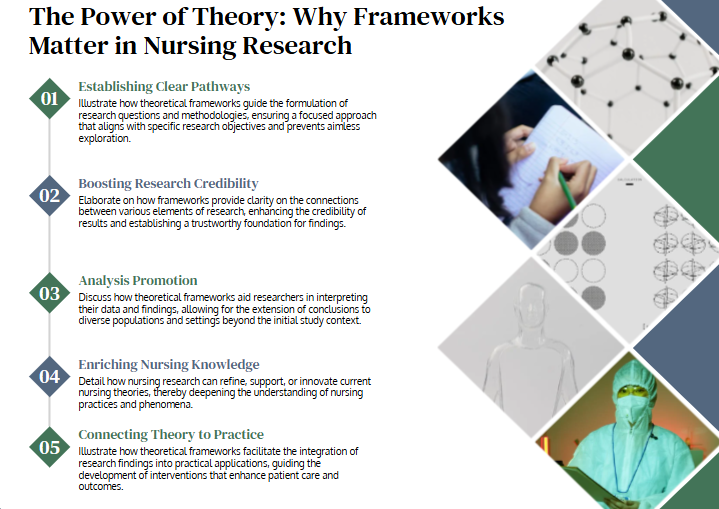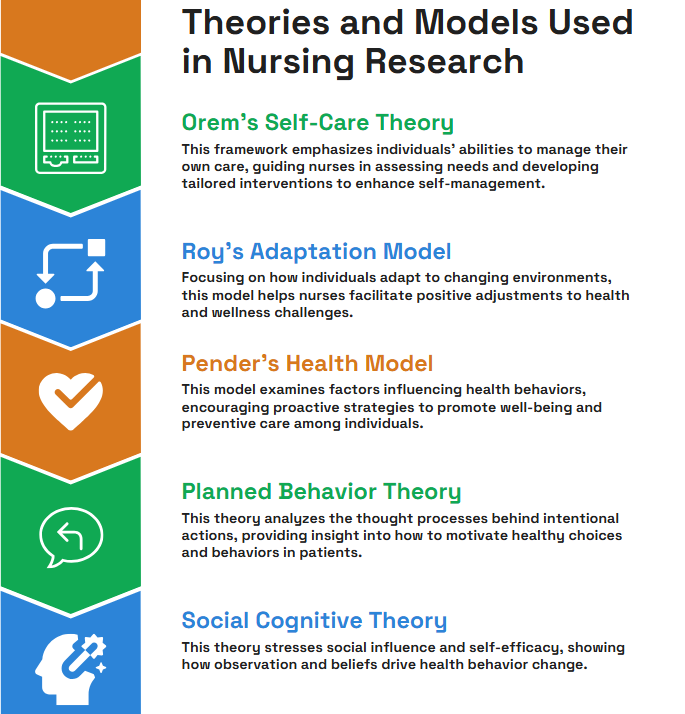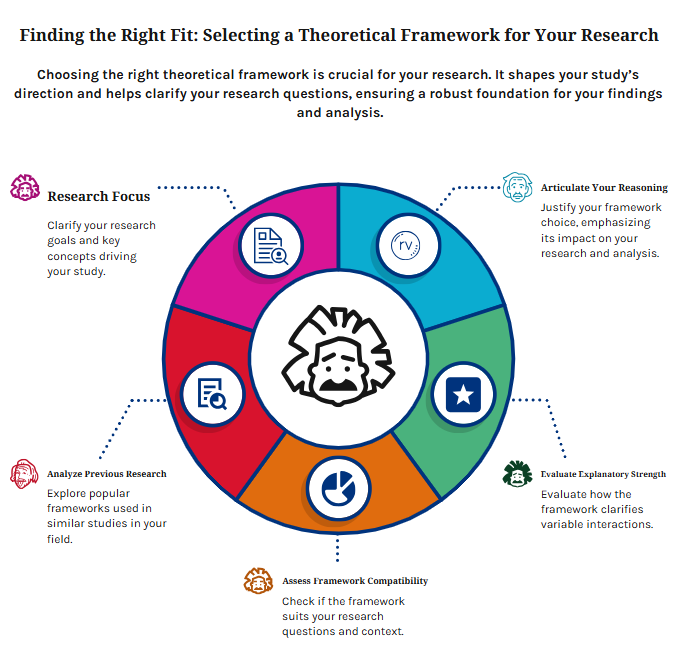
Table of Contents
Nursing research, a cornerstone of evidence-based practice, strives to understand and improve patient care, health outcomes, and the broader healthcare system. However, simply collecting data isn’t enough. Research must be guided by a clear and robust structure – a framework that provides the lens through which we view the phenomenon under investigation. This is where the power of theoretical frameworks in nursing research becomes paramount. They act as both a compass, directing the researcher’s path, and a map, helping them interpret the terrain they encounter.
The significance of theoretical frameworks in nursing research cannot be overstated. They move research beyond descriptive accounts, towards a deeper understanding of relationships, influences, and causal mechanisms. Without a theoretical grounding, research risks being fragmented and lacking the rigor needed to contribute meaningfully to the body of nursing knowledge. A robust theoretical framework provides a foundation for identifying key concepts, defining variables, and interpreting findings within a coherent and logical context.
What Are Theoretical Frameworks?
At its core, a theoretical framework is a structured explanation of how the researcher believes the variables in a study are related. It’s not simply a list of concepts, but a narrative that connects those concepts and articulates the assumptions that underpin them. These frameworks can draw from established theories, existing models, or even develop from conceptual maps the researcher crafts based on their initial understanding. The strength of a theoretical framework in nursing research lies in its capacity to provide a roadmap for the entire research process, from the initial research question to the analysis and dissemination of findings.
Why are Theoretical Frameworks Crucial in Nursing Research?
Several compelling reasons underscore the necessity of employing theoretical frameworks in nursing research:
- Provides Direction and Focus: A clearly articulated framework guides the research process. It helps researchers determine which variables are essential, which questions to ask, and what methods are most appropriate. Without this direction, research can become unfocused and prone to tangents, leading to ambiguous or inconclusive results. Theoretical frameworks in nursing research help keep the researcher on track and grounded in the central research question.
- Enhances Rigor and Validity: By providing a logical explanation for the relationships between variables, theoretical frameworks in nursing research bolster the scientific rigor of the study. They ensure that the research is not arbitrary, but grounded in an established body of knowledge or a well-articulated conceptualization. This rigor enhances the validity of the findings and increases their credibility within the scientific community.
- Facilitates Interpretation and Generalization: The framework provides a lens through which researchers can interpret their findings. It offers a context that can help make sense of patterns, anomalies, and unexpected outcomes. This context is crucial when attempting to generalize research findings to other populations and settings. A strong theoretical framework in nursing research allows researchers to connect their findings back to broader theoretical understandings and the existing body of evidence.
- Contributes to Nursing Knowledge: When researchers utilize and test established theories within their studies, they are either providing support for the theory, refining it through new findings, or highlighting areas for needed modification. Without this grounding, the research risks becoming isolated and having limited impact on nursing practice and knowledge. The development, testing, and refinement of theory is significantly dependent on the application of theoretical frameworks in nursing research.
- Improves Practice: Ultimately, nursing research aims to improve patient care. Theoretical frameworks in nursing research help to bridge the gap between research findings and practice by providing a conceptual foundation for translating research into tangible interventions and protocols. By understanding the theoretical underpinnings of phenomena, nurses can make more informed decisions about their practice.

Selecting and Developing Theoretical Frameworks in Nursing Research
The process of selecting or developing an appropriate framework is a critical step in the research process. It involves careful consideration of several factors. Here are the key factors to consider when selecting and developing theoretical frameworks in nursing research.
- Alignment with the Research Question: The chosen framework must be relevant to the research problem under investigation. The concepts, relationships, and assumptions within the framework should directly connect to the research questions and objectives. It should be clear how the chosen framework will inform the investigation. If the existing frameworks are not aligned, you may need to develop a conceptual framework informed by the body of evidence to answer your research question. This step shows the importance of theoretical frameworks in nursing research and how it’s not a simple choice of one.
- Comprehensiveness and Depth: The framework should address the key variables and factors that are likely to influence the phenomenon under study. It should provide a sufficiently comprehensive picture of the research context and allow for exploration of relationships between key concepts. Theoretical frameworks in nursing research should not be overly simplistic, but rather offer the depth and complexity needed for a sound investigation.
- Relevance to the Population and Setting: The framework needs to be appropriate for the specific population and setting in which the research will be conducted. Cultural factors, social context, and ethical considerations need to be carefully considered when deciding on the suitability of a framework. A seemingly suitable framework may not translate to an adequate exploration in all settings, further demonstrating the importance of theoretical frameworks in nursing research.
- Accessibility and Practicality: The concepts, definitions, and relationships within the framework should be accessible and easily understood by the researcher and the research team. It should also be practical to implement within the scope and resources of the research study. Overly abstract frameworks may prove difficult to translate into concrete research methods and interpretations. Researchers must carefully consider the practicality of the theoretical frameworks in nursing research during the selection process.
- Existing Knowledge and Literature: A careful review of existing literature is essential to identify potential frameworks and to understand how similar research questions have been previously approached. This review helps ensure that the chosen framework is aligned with current scientific understanding and avoids unnecessary duplication of effort. It’s important to review how others have used theoretical frameworks in nursing research to inform the current approach.
Theories and Models Used in Nursing Research
Nursing, as a practice-based profession, draws on a rich array of theories and models from various disciplines. Some commonly used examples include:
- Orem’s Self-Care Deficit Theory: This theory focuses on individuals’ capacity for self-care and provides a framework for assessing nursing needs and planning interventions.
- Roy’s Adaptation Model: This model views individuals as adaptive systems and focuses on promoting adaptation in response to internal and external stimuli.
- Pender’s Health Promotion Model: This model explores the various factors that influence individuals’ health-promoting behaviors.
- The Theory of Planned Behavior: This theory examines the cognitive determinants of intentional behavior and can be applied to understanding health-related actions.
- Social Cognitive Theory: This theory emphasizes the influence of observational learning, self-efficacy, and other cognitive factors in behavior change.

Researchers might also draw on theories and models from psychology, sociology, public health, education, and other relevant fields. The choice of framework should always be driven by the specific research question and objectives. These varying theories provide a robust landscape of resources for the use of theoretical frameworks in nursing research.
The Importance of Explicitly Stating Your Framework
The final and incredibly important element in the process is explicitly stating the chosen framework within the research proposal and report. This transparency allows other researchers to understand the theoretical lens through which the study was conducted. It also facilitates replication and allows for comparison of findings across different studies. Clear communication of the chosen framework adds to the overall credibility and scientific integrity of the work and reinforces the importance of theoretical frameworks in nursing research.
Challenges and Considerations in Formulating Theoretical Frameworks
While theoretical frameworks in nursing research are essential, researchers also face some challenges:
- Complexity: Some theoretical frameworks can be complex and abstract, making them challenging to apply in concrete research studies.
- Availability: An ideal framework might not exist for a specific research question, requiring researchers to adapt or develop a novel framework.
- Integration: Integrating complex or diverse ideas into a single framework can be difficult.
- Flexibility: Researchers must remain flexible and open to modifying their chosen framework as the research progresses. New findings may challenge the initial framework and require adjustment to capture the emerging understanding. It’s important to remember that theoretical frameworks in nursing research are not static.
Common Pitfalls in Theoretical Frameworks for Nursing Research
The bedrock of robust nursing research lies in a well-constructed theoretical framework. It’s the lens through which researchers interpret findings, providing a structure for understanding complex phenomena within the nursing discipline. However, the process of developing these frameworks isn’t without its challenges. Falling prey to common pitfalls can weaken research, leading to misinterpretations and ultimately, less impactful outcomes. Let’s examine some crucial areas to avoid:
1. Ignoring the Purpose of a Framework
One fundamental error is not fully grasping the role of a theoretical framework. It is not simply a theoretical backdrop thrown in for appearances. Rather, it’s a roadmap, guiding the research process from beginning to end. It provides context for the research questions, influences the methodology, and shapes the interpretation of findings. When a framework is chosen haphazardly or without careful consideration of the research aims, the entire study risks lacking coherence and meaning. Researchers must diligently select a framework that aligns with their specific area of inquiry, whether exploring health promotion, patient experiences, or interventions effectiveness. To not do so is to undermine the value of theoretical frameworks in nursing research.
2. Selecting an Unsuitable Framework
This pitfall often stems from a lack of understanding of the diverse range of available theoretical frameworks within nursing and related disciplines. Researchers might opt for a popular model without critically evaluating its relevance to their study’s context. For instance, a framework developed for acute care may not be appropriate for a community health intervention. A careful examination of a frameworks assumptions, concepts, and applicability is critical. Failing to carefully weigh these factors can lead to a mismatch between the chosen framework and the research problem, limiting the study’s utility.
3. Overly Broad or Narrow Frameworks
The ideal framework strikes a balance. A framework that is too broad can lead to unfocused data collection and vague interpretations. It may fail to identify the key variables or processes being studied. Conversely, a framework that is too narrow may limit the scope of the research and prevent the identification of important contextual factors. A skilled researcher is adept at carefully selecting a framework which offers enough structure and definition but is still flexible enough to capture the complexity of the phenomena under examination. The best theoretical frameworks in nursing research allow for discovery without being overly prescriptive.
4. Not Explicitly Connecting Framework to Research
A framework is not useful if it sits separately from the rest of the study. It’s not enough to simply mention the framework. Researchers must clearly articulate how the chosen concepts and their relationships will be operationalized within the research methods. They must explain how the framework informed the research questions, data collection instruments, and analytical approach. This requires a meticulous approach, demonstrating the specific link between the theoretical constructs and the measured variables. Without this clear connection, the research may lack internal validity and limit the generalizability of the findings.
5. Neglecting the Evolution of Knowledge
Nursing is a dynamic discipline, constantly adapting to new discoveries and insights. A static approach to theoretical frameworks in nursing research is a common mistake. Researchers need to critically evaluate whether their framework is still relevant to the current body of evidence, and consider how to build on existing knowledge. Ignoring the most recent research or failing to integrate new perspectives can lead to outdated or incomplete findings.
By being mindful of these common pitfalls, researchers can enhance the quality and relevance of their work. Developing robust theoretical frameworks in nursing research is not just a technical task, it is an art requiring critical thought, deep understanding of nursing theory, and a commitment to evidence-based practice. It’s a pathway towards more impactful research and, ultimately, better patient outcomes.
Conclusion
In conclusion, theoretical frameworks in nursing research are not simply an academic exercise, but rather an essential element of robust and meaningful research. They provide direction, enhance rigor, facilitate interpretation, and ultimately contribute to the body of nursing knowledge. By thoughtfully selecting and employing appropriate frameworks, nursing researchers can ensure their work is both scientifically sound and relevant to the needs of patients and the broader healthcare system.
Careful consideration of the appropriate theoretical perspective further strengthens the contributions of research to the development of practice, highlighting the importance of theoretical frameworks in nursing research in improving care. The careful application of theoretical frameworks in nursing research is vital for continued advancements in the field. Without them, research is simply data collection, rather than the generation of meaningful knowledge.
Frequently Asked Questions about Theoretical Frameworks in Nursing Research
Nursing research, like any scientific endeavor, requires a solid foundation. That foundation often comes in the form of a theoretical framework, and it’s no surprise that researchers, both novice and experienced, frequently have questions about their use and application. Let’s delve into some common concerns.
What exactly is a theoretical framework in nursing research?
At its core, a theoretical framework is a structure that helps researchers organize, understand, and interpret their research. It’s like a blueprint that outlines the relationships between key concepts and variables under investigation. Instead of starting from scratch, you’re basing your study on a known theory or model. This provides a lens through which to analyze your data and explain your findings. Think of it as a guide that dictates how you view the world and interpret the phenomenon you’re studying.
Why are theoretical frameworks so important in nursing research?
The use of a theoretical framework in nursing research adds rigor and credibility to the study. It ensures that research is not just a collection of data but a meaningful exploration of a defined area. A good framework helps clarify the research question, identify key variables, and determine the research methodology. It also enables researchers to connect their findings to the existing body of knowledge, making it easier to generalize and build upon the results of prior studies. Furthermore, it provides a framework for the interpretation of the results, ensuring the conclusions drawn are supported by existing theories or models.
How do I choose the right theoretical framework for my study?
Selecting a framework isn’t about picking the first one that comes to mind. It requires careful consideration of your research topic and the nature of the concepts you are exploring. Ask yourself: What is the nature of the phenomenon I’m investigating? What theories are commonly used in this area of study? Does the theory align with my research questions and methodology? Start by reviewing the literature extensively to see what frameworks have been utilized in similar studies. Then, examine how the theoretical framework explains relationships and mechanisms, and ensure it is suitable for your study population.

Can I use more than one framework in my research?
While using multiple frameworks might seem like a good idea to broaden your perspective, it can make your research more complex and potentially confusing if not handled correctly. If combining frameworks, each must be clearly defined and justified in relation to the research question. Usually, starting with a single, well-defined framework, especially when starting out, provides a clearer and more focused pathway for your research.
Where can I learn more about using theoretical frameworks in nursing research?
Numerous resources are available, including research methodology textbooks, journal articles focusing on specific theories and frameworks, and online workshops. Seek guidance from experienced researchers and your academic advisors to further refine your skills in using theoretical frameworks in nursing research. Understanding how to properly apply them will ultimately strengthen the rigor and impact of your research contributions to the nursing profession.
Get Professional Help with Nursing Research
At PhD Nurse Writer, we can help you with researching and writing nursing papers for undergraduate, graduate and post graduate levels. Besides nursing research and writing, we also do proofreading, editing, formatting and plagiarism removal. We have highly experienced and skilled writers to deliver authentic and top notch nursing research papers, essays and dissertations for academic excellence.





